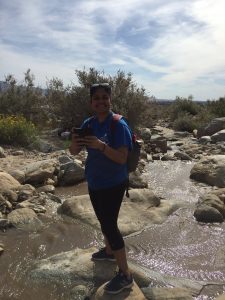Name: Ahana Chakraborty
Hometown: San Diego, California
Lab: Molecular Neurobiology Laboratory of Shrek Chalasani
Lab website: https://chalasani.salk.edu
Hobbies: Drawing and painting, baking
What do you study? I study autism spectrum disorders using the microscope nematode, Caenorhabditis elegans, as a model organism. C. elegans is a tiny hermaphroditic worm (meaning that it can reproduce without a mate if necessary!) with only about 100 million base pairs (genetic “letters”) and 300 neurons. In comparison, humans have about 4.6 BILLION base pairs, and about 86 BILLION neurons. That’s a huge difference!
Why is it important? Autism spectrum disorder (ASD) affects about 1% of the population, which seems like a small fraction but actually includes about 75 million people! Because ASD constitutes a large range of similar disorders, it’s difficult to pinpoint what specifically causes people to be born with a disorder; in the scientific world, there’s a lot of possibilities. Working with model organisms helps to narrow down the potential causes in order to eventually create a preventative or curative treatment.
What piqued your interest in science? I’ve always wanted to discover something new, and at the same time help others. When I first learned about biology in middle school, I realized that it was going to be the perfect field for me to achieve my goals. This was reinforced through all the other science classes I took throughout high school, as well as different labs I got to work in.
What do you like about being a scientist? Science is always changing! Many times, what we expect to happen just doesn’t go that way. Instead of becoming discouraged because our results aren’t necessarily what we wanted, we get to learn something unique and pursue a brand-new question! Failure is never an obstacle, but rather just a steppingstone to something else.
What are 5 general vocabulary terms someone should know going into your field of science?
Hypothesis, microscopy, fluorescence, model organism, experiment
What are 5 specific vocabulary terms someone should know about your research?
Autism, avoidance, strain, genotype, phenotype

